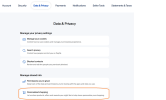GTP
Well-Known Member
- Reaction score
- 10,031
- Location
- Adelaide, Australia
Hmmm, so glad I don't have Instascam, Fakebook or PayPal. Meta stored hundreds of millions of passwords "in the clear." (Plain Text)
He also explains how to stop PayPal's data collection in settings.
Interesting discussion by Steve Gibson on Security Now episode #995
He also explains how to stop PayPal's data collection in settings.
Interesting discussion by Steve Gibson on Security Now episode #995



